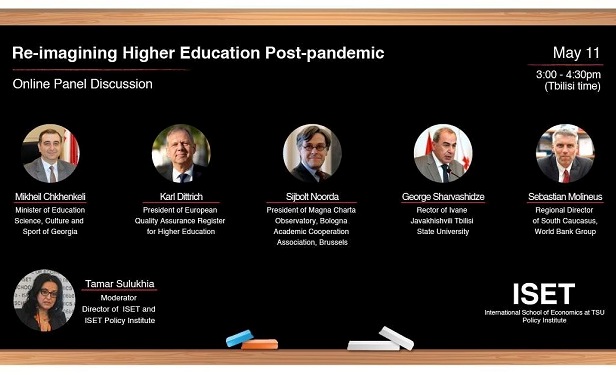2020-05-17
Re-imagining Higher Education Post-pandemic
 International School of Economics at TSU (ISET) and ISET Policy Institute held second in the series of international Policy Panels – Re-imagining Higher Education Post-pandemic.
International School of Economics at TSU (ISET) and ISET Policy Institute held second in the series of international Policy Panels – Re-imagining Higher Education Post-pandemic. Several distinguished panelists were invited to join the online discussion, among them Dr. George Sharvashidze, Rector of TSU; Dr. Mikheil Chkhenkeli, Minister of Education, Science, Culture and Sport of Georgia; Dr. Karl Dittrich, President of European Quality Assurance Register for Higher Education; Dr. Sijbolt Noorda, President of Magna Charta Observatory, Bologna and Academic Cooperation Association; Dr. Sebastian Molineus, World Bank Regional Director for the South Caucasus. The event was moderated by Dr.Tamar Sulukhia, Director of ISET and ISET Policy Institute.
Experts spoke about impacts of COVID-19 pandemic on the higher education sector globally and expressed their views on the longer-term prospects and challenges for the universities and students, how financial, economic and demographic pressures will impact demand, enrollment and mobility in higher education, will higher education be able to re-invent itself and push the frontier forward.
In his address to the participants, Minister Mikheil Chkhenkeli said: “Thanks to ISET and ISET leadership for putting the panel together. For the participants, of course, this is going to be a very interesting and very valuable and useful online panel. Indeed, there are quite a lot of challenges and the situation that entire world found itself in during this pandemic. Humankind has never seen anything like this, including the education sector. The challenges for the entire world were absolutely new and these challenges are quite serious. Everyone in education sector, including in Georgia, we understood that even through the challenges made it impossible to continue the standard teaching process in classrooms and auditoriums, we all understood that no matter what the challenges are, the process of educating our youngsters should not stop. I am very happy and proud to say that we prevailed and due to lots of efforts, joint efforts by, primarily of course, educators, by leaders of schools, universities, our ministry, our government, with the help of our international friends and partners, we were able to counter these challenges at every level of education.”
Minister Chkhenkeli also noted that the first assessments that Georgia received about its efforts in dealing with challenges and establishing distance education were “very high praises from OECD.” “As you know, in their report, Georgia was mentioned as one of the exemplary countries in the efforts of dealing with these challenges,” he added.
Rector of Tbilisi State University, George Sharvashidze said that nobody was really anticipating or waiting for COVID-19 “to come to our reality.” So, it was “really a shock for educators in foreign countries,” he said. The Rector noted that the difficulties faced by various sectors, including the education sector, were overcome through solidarity both internally and externally. “We had students stuck in Italy, Spain, different countries and we had to work with our colleagues online, with the ministries of education, foreign affairs in order to get them home. That was a very pressing need. The second point was to organize online courses in synchronized way, not synchronized way and that’s a big challenge for big public universities. We have 20,000 students and we had to change, due to security, cybersecurity reasons, all passwords and create new accounts in order to create online system at our university,” Rector Sharvashidze said.
He also noted that TSU offered everybody free online access to scientific and research resources, library, introduced financial privileges for the use of student dormitory and offered students a flexible payment system.
“Nowadays, the landscape of our traditional international cooperation is, indeed, changing and physical mobility is, probably, no longer available at the same level as before. So, we have to think about something different here, how to foster cooperation and develop local capacities, because, you know, reality is very severe in this respect,” he added.
« back to list

